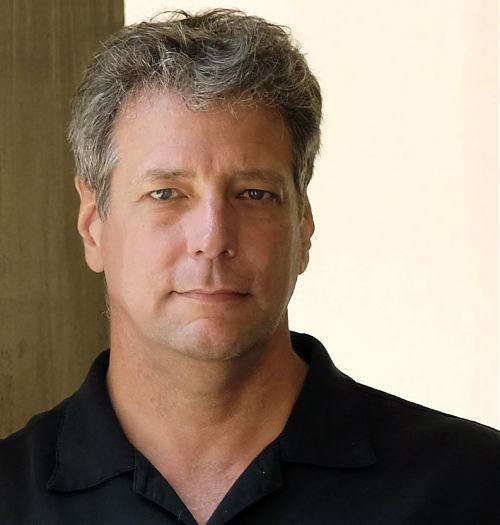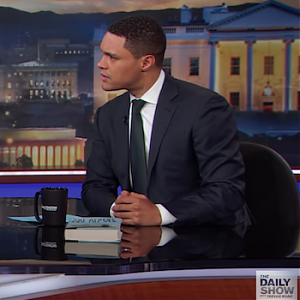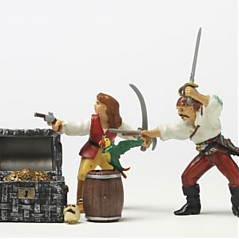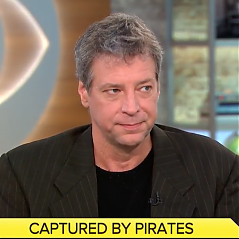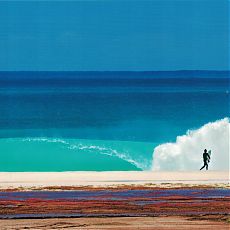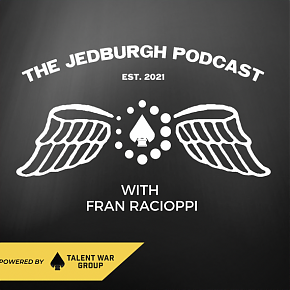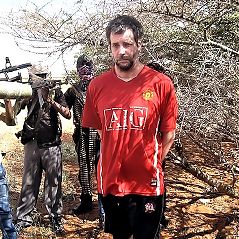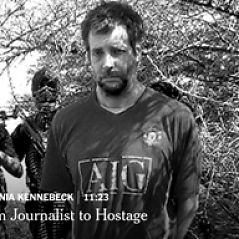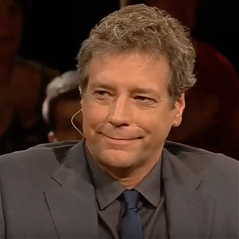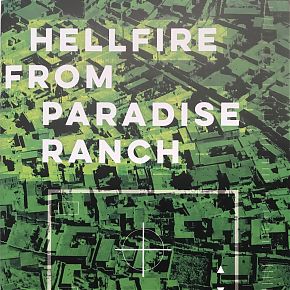There Will Be No Trojan War
The Afghanistan invasion, protested onstage
December 2001
Since the Shotgun Players are the only local theater troupe to rearrange their season in response to September 11, and since There Will Be No Trojan War is a witty, durable, and pacifist play — worth mounting even in peacetime — it seems impolite to ask an obvious question. Does it apply to Afghanistan? Jean Giraudoux wrote it in 1935 as a warning to Europe about World War II. He was a career diplomat, so he could see how the wind was blowing; but even his artful cry for common sense applied more to 1914 than it did to 1939. In some ways it was dated from the start.
The play does have a sprinkling of lines that apply to September 11, and the Shotgun Players try to emphasize them in a solid, modern-dress production. Malcolm Brownson plays an authoritative Hector in a presidential suit and tie. John Patrick Moore is a shambling irresponsible Paris in an open silk shirt and pukka shells. Hector’s royal parents, Hecuba and Priam (Trish Mulholland and Fred Ochs), look like rich relations from Florida; and Cassandra the prophetess (Kimberly Wilday) hangs around sultrily in sweats and a fur-collared suede coat.
Giraudoux meant the script as a farce, not an allegory, so it works better as a general anti-war play than as specific protest. Hector the Trojan general wants to avoid a conflict with the Greeks by sending Helen home. The undoing of his peace campaign has a stupid, familiar inevitability. “Explain to me what you think Helen has given to us, worth a quarrel with the Greeks?” he asks. Demokos the warmongering poet and the other Trojans can imagine lots of reasons for keeping Helen and plunging into ten long years of grief and waste; but the reasons come down to blustery pride, which more than anything else mimics the start of the World War I. World War II turned out to be different, because Hitler spoiled for a fight. And the Afghan war is different, too.
Still, there are similarities. “When war is in the air,” says Hector, “everyone learns to live in a new atmosphere: Falsehood.” Demokos the poet says Trojan soldiers need to be “reinforced by the spiritual and moral intoxication which the poets can pour into them … I have a notion to compare War’s face with Helen’s.” (He serves as a kind of Fox News Channel for Troy.) Busiris the lawyer points out that the Greek ships massing off the coast have hoisted their flags, as an insult, to a position reserved for saluting cattle barges. Hector can’t ignore that, can he? “The situation can only be resolved in one of two ways,” declares Demokos. “To swallow an outrage, or return it.”
Dooley and his actors bring out more of Giraudoux’s wackiness than a more stolid group of actors would — for example Andy Alabran’s bare-assed taunting of the Greeks, Trish Mulholland’s excellent speech comparing war to the hind end of a baboon (“scarlet, scaley, glazed”), and Clive Worsley’s hammy performance as the poet, at the piano, composing a warlike anthem for Troy. The flip side of this approach is that the whole cast seems uncomfortable with Giraudoux’s formal language. Roxana Ortega plays an alluring Helen but not a very sophisticated one. Moore is a ’70s-playboy Paris who can’t quite pull off his diplomatic lines. And Wilday’s Cassandra lacks a madwoman’s gravitas. Cassandra needs to be young and beautiful, like Wilday, but also crazed, like Ophelia — she should rage out her unheeded prophecies of war. Wilday drops her prophecies in bitter little asides, like Jennifer Aniston in a snit. Director Patrick Dooley must have done this on purpose. He probably thinks it’s funny, and it is, up to a point. But other touches of humor are more successful.
Trojan War is a Giraudoux masterpiece — a chatty, two-and-a-half-hour masterpiece — and by rehearsing and mounting it last-minute the Shotgun Players have made a real contribution to a generally flagging season of local theater. No current Bay Area play has as much meat and significance as this one. However, the moral text for Afghanistan is not Giraudoux’s. It’s the Baghavad-Gita, “Krishna’s Counsel in Time of War,” about the Indian prince Arjuna going reluctantly to battle. I think Giraudoux would admit the difference between a frivolous, taunting banner flown from a Greek mast and three fuel-heavy jetliners flown into inhabited buildings; Krishna himself advises that pacifism is sometimes more craven than war. The trick, he tells Arjuna, is to keep the fight from becoming an exercise in greedy, self-interested slaughter. Whether Bush and his cabinet have the will for that trick is another, altogether disturbing question, which this play doesn’t quite touch.
Michael Scott Moore
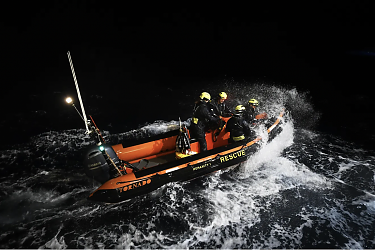
Rafts of the Medusa
Why every day on the Mediterranean is a new scandal for Europe. For both Foreign Policy and Die Zeit.
California’s Attempt at Land Reparations
How land seized from a Black family 100 years ago may be returned. The Bruce’s Beach story from a hometown angle, for The New Yorker
Day of the Oprichnik, 16 Years Later
The novelist Sorokin, the president Putin, his man Dugin, and the war in Ukraine. For n + 1.
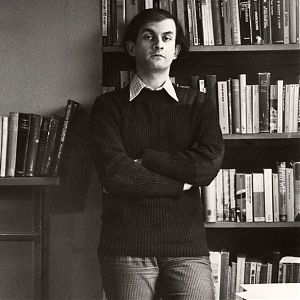
The Rushdie Narrative
Knife and the crumbling ground beneath free speech
There Must Be Some Way Out of Here
An essay on Bob Dylan, “All Along the Watchtower,” and Somali pirate captivity.
That Mystic Shit
The life of Lou Reed in two biographies

Cambodian Seafarers Talk About Pirates
Mike visits Cambodia for The New Yorker to talk about a harrowing shared experience in Somalia
The Muslim Burial
Cambodian hostages remember digging a grave for one of their own. A sequel chapter to The Desert and the Sea
The Real Pirates of the Caribbean
Adventure journalism in Southern California. A travel essay for The Paris Review.

Antifa Dust
An essay on anti-fascism in Europe and the U.S., for the Los Angeles Review of Books
Was Hitler a Man of the Left?
A book that helped Republicans in America lose their damn minds.
Ghosts of Dresden
The Allied firebombing of Dresden in 1945 destroyed the baroque center of what Pfc. Kurt Vonnegut called, in a letter home from Germany, “possibly the world’s most beautiful city.”
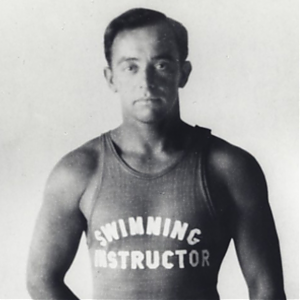
George Freeth, Biographed
The first academic treatment of America’s surf pioneer. Also, was Freeth gay?
It’s Called Soccer
Americans live on what amounts to an enormous island, defended on two shores by the sea, and we’ve evolved a few marsupial traditions that nobody else understands.
Tilting at Turbines (in the Severn River)
The morning was clear and cold, with frost on the church steeple and the cemetery grass. I had a quick English breakfast at a white-cloth table, in my wetsuit, and drove to Newnham, a village on the Severn River in Gloucestershire, parking near the White Hart Inn.

The Curse of El Rojo
I’d packed the car lightly — a bag of clothes, a bag of cassette tapes, a backpack of books, a few essential tools.









